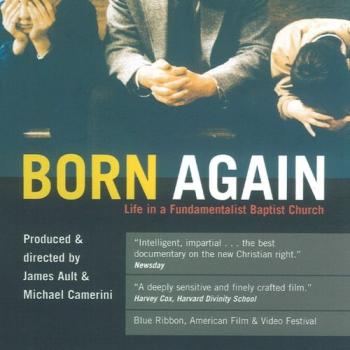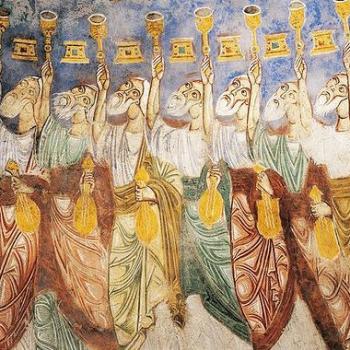A Mysterious Topic: “Mystery,” “Paradox,” and “Contradiction” in Theology (Part 2)
If you have not read Part 1 (posted May 31, 2012) please read that first. This may not make any sense otherwise.
One way in which some well-meaning but misguided persons have attempted to resolve the seemingly intractable differences between divine determinism, including evil as part of God’s plan rendered certain by God, and creaturely free will as power of contrary choice, including evil as not part of God’s plan and not rendered certain by God but the result of creaturely decision and action, is appeal to mystery.
An old sermon illustration has it that absolute divine sovereignty, meticulous providence, and free will, power of contrary choice, are like two train tracks that seem incommensurable but somehow join in the distance beyond the horizon of human sight. Of course, any thinking person who hears that illustration immediately things to herself “But they don’t join in the distance!”
A perhaps more reasonable illustration, applied to salvation, that allegedly resolves the dilemma between monergism and human responsibility and decision, is the following: As one approaches the gate of heaven one sees a sign that says “Whosoever will may enter here freely,” but when the person enters and looks back at the other (inner) side of the gate one sees that it says “For you were chosen from before the foundation of the world.” Of course, any thinking person who hears that illustration in a sermon will immediately realize that it is meant only to illustrate (and therefore defend) monergism.
More sophisticated appeals to mystery to resolve the dilemma avoid illustrations such as those and simply say “It’s a mystery.” As I stated in Part 1, I have no quarrel with appeal to mystery in theology so long as it is not a resort to embrace of contradiction.
It seems to me, however, that appeal to mystery to handle the dilemma stated above necessarily involves one in contradiction. The dilemma is not between “God’s sovereignty” and “free will” as some state it. We who believe in libertarian free will (as power of contrary choice) also believe in God’s sovereignty. God is sovereign over his sovereignty and limits his determining power to make room for other determining powers. The dilemma is between divine determinism (belief that God determines everything that is to happen even if only indirectly causes much of it) and limited providence—God’s governance of all that happens without determining it in every detail.
Those two cannot both be believed without falling into sheer contradiction. And sheer (logical) contradiction is always and in every context a sign of error. To embrace it in theology is a form of special pleading that removes theology from intelligible discourse and requires a sacrifice of the intellect. A person who embraces contradiction (which I’m not sure is even possible!) has no ground for objecting to others who embrace contradiction.
Several questions arise. First, does revelation communicate sheer, logical contradiction? I hope not. Some argue it does. For example, they point to passages that allegedly say that God is the author of sin and evil (or its designer and governor) and (others) that say sin and evil are creatures’ doing, not God’s. Both Calvinism and Arminianism attempt to resolve the apparent contradiction by privileging one set of passages over the other or finding a hermeneutical “tool” such as divine self-limitation, prevenient grace, secondary causation, compatibilism, etc. that will relieve the paradox.
Some theologians (and non-theologians) prefer to simply let the contradiction be. To them, to use a popular saying “It is what it is.” So leave it alone. Embrace it.
Now let’s play with that idea a little to see what happens.
The preacher gets up in the pulpit and says “God determines everything including evil. God planned and rendered certain the holocaust and the torturous death of a little child from leukemia. And these horrible evils and instances of innocent suffering are the result of human rebellion and its resultant curse on creation. God does not want them to be, but allows them.” Who could blame his listeners who shake their heads in bewilderment and think either the preacher is nuts or they dozed off for a moment and missed something?
Even more to the point, imagine the theologian who teaches theology in a university and is invited to be on a panel with a variety of scholars from across the curriculum to discuss the nature of evil and its source. They all posit their theories and then it’s his turn and he says “God plans it and does it and God doesn’t want it and doesn’t do it.”
Surely his colleagues will press for further explanation and insist on it. Insofar as he refuses and simply rests with the contradiction his colleagues will simply write him (and possibly theology) off as anti-intellectual if not unintelligible.
Now, the moment you go further and attempt to “explain” using concepts such as John Piper’s “two wills of God” you have abandoned contradiction (or at least attempted to) and attempted to resolve the paradox. That’s not what I’m objecting to. I’m objecting to those who say we should simply rest with contradiction and not attempt to reconcile the apparent opposites found in Scripture.
Let’s look at a specific example: Philippians 2:12-13 “Work out your own salvation…for God is at work in you….” Some (e.g., D. M. Baillie) have labeled this the “paradox of grace.” I have used that term myself. I’m okay with that. As I explained in Part 1, I find certain paradoxes inevitable signs of mystery. But is it a sheer contradiction? I hope not. One of theology’s tasks is to show that, even though we cannot plumb the depths of God’s agency and ours in salvation, thus reducing mystery to something completely comprehensible to the finite intellect, there is no need to embrace sheer contradiction.
Philippians 2:12-13 is not a contradiction once we see and acknowledge that our “work” is not the same as God’s “work” in salvation (including sanctification). Two different Greek words are translated “work” in these two verses. There’s our first clue that no contradiction is involved. However, knowing their meanings doesn’t automatically resolve the apparent tension. Theology steps in, however, to say that God’s work surrounds and underlies, enables, our “work” which is simply to allow God to do his work in us.
I use a homely illustration. Every summer here in central Texas I struggle to keep bushes alive. I turn on the outdoor faucet to which a hose is attached and drag the hundred foot hose around the house to a thirsty bush. I aim the spray nozzle at the bush and press the trigger. Nothing comes out. I go back to make sure the faucet is actually turned on. It is. Pressurized water is there in the hose. Then I realize there’s got to be a kink somewhere in that long hose that’s keeping the water from flowing. I track the length of the hose, find the kink(s) and straighten them out.
The water represents God’s grace; the kink(s) represents a wrong attitude or habit or desire that blocks up the flow of God’s grace in my life. My task is to remove those with the Spirit’s help.
The analogy breaks down, of course, in that, in my spiritual life, removing the “kinks” is just as much God’s work as mine, but I have to want it and permit it. The “energy” (one of the Greek words translated “work”) is all God’s. All I contribute is heartfelt desire, prayer and submission. That’s also “work” insofar as it’s not easy; it’s not what comes naturally.
Philippians 2:12-13 may express a paradox, but it doesn’t express a sheer contradiction. It would only be a contradiction if it said that salvation is exclusively God’s work and exclusively mine. It doesn’t say that. It implies a cooperation—a synergy. At least that’s the best way to interpret it.
If we are going to embrace contradictions, then theology really has nothing to do. Every apparent contradiction in Scripture should just be embraced without any effort to show how they are not really contradictions. The results of the deliberations of the councils of Constantinople and Chalcedon were explanations of how what Scripture says about God and Jesus Christ are not contradictions. They are mysteries, but not contradictions.
On this I am in total agreement with R. C. Sproul who emphatically rejects efforts by fellow Calvinists (and others, of course) to affirm contradiction. I have detailed that in Against Calvinism and cited Sproul’s works.
Mystery—yes. Paradox—uncomfortably yes. Contradiction—no. Admittedly it is not always easy to tell what’s a paradox and what’s a real contradiction. But some things are obviously contradictions. To affirm divine determinism and creaturely non-compatibilist free will is a contradiction. There’s no way around it. And it’s absurd. It makes Christianity unintelligible nonsense. That doesn’t serve anyone well.











